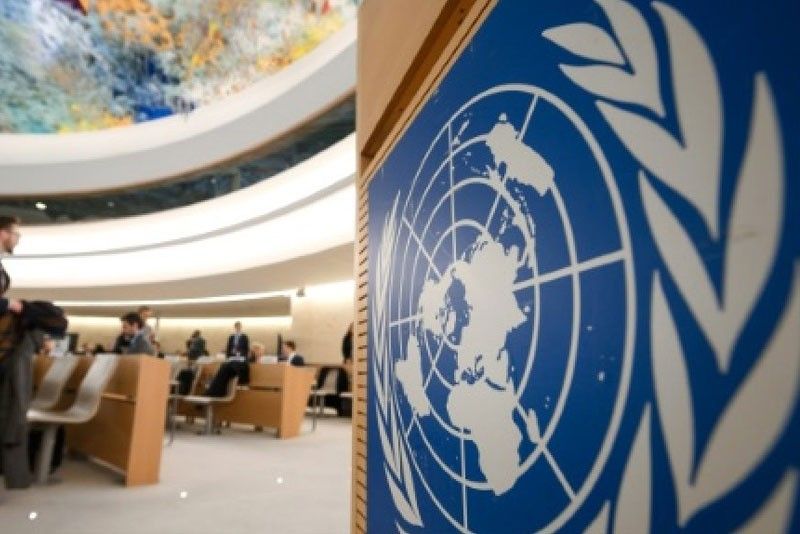Philippines eyes withdrawal from UN rights body

MANILA, Philippines — The Philippines’ top diplomat hinted at the possible withdrawal of the country from the United Nations Human Rights Council (UNHRC) after the adoption of an Iceland-initiated resolution to investigate President Duterte’s bloody “war on drugs.”
The resolution on the Philippines was adopted by the Council on Thursday by a vote of 18 countries in favor and 14 against, with 15 abstentions.
“No embassy in Iceland. Nor does Iceland have an embassy here. Iceland took the place of the US after it withdrew from the Human Rights Council. I think we need to follow America more,” Foreign Affairs Secretary Teodoro Locsin Jr. said on his Twitter account Saturday night, replying to a question on whether the Nordic island nation had a Philippine envoy.
The US withdrew from the UNHRC in June 2018 in protest of what it perceived as an entrenched bias against Israel, and a willingness to allow notorious human rights abusers as members.
Previously, the Philippines had withdrawn from the Rome Statute, the founding treaty of the International Criminal Court (ICC), which became effective on March 17, 2019.
But ICC Prosecutor Fatou Bensouda announced that the ICC’s preliminary examinations into the situation in the Philippines continue and the court retains its jurisdiction over crimes committed in the context of the “war on drugs” while the country was a member, even after its withdrawal from the Rome Statute became effective.
Withdrawing from the UNHRC is inconsistent with the Philippines’ statement following the adoption of the resolution, Commission on Human rights chairman Chito Gascon said.
“Essentially, we said the Philippine government should cooperate because it is a member of the UN,” Gascon said.
Last Thursday, following the adoption of the resolution, Locsin had said the Philippines will continue to work in the Council. “The temptation is strong to walk away.. But the Philippines must remain true to the cause of human rights,” he said.
Police authorities have said at least 6,600 people have been killed in anti-illegal drug operations since Duterte took office in July 2016. But human rights groups said there are more than 27,000 drug-related killings that are filed by the police as “homicides under investigation.”
Locsin earlier said any investigation resulting from the Iceland resolution will not be allowed into the Philippines.
Vice presidential spokesperson Barry Gutierrez, in a radio interview on dzXL yesterday, said he backed Vice President Leni Robredo’s statement that the government should cooperate with a review to be conducted by the UNHRC into the alleged extrajudicial killings in Duterte’s drug war. He said he agreed with Robredo that the government should not prevent UN personnel from doing their work if it is not hiding anything.
Gutierrez further warned of possible UN sanctions against the Philippines if the government is found guilty of committing human rights violations and refused to act on these.
“If the finding is negative, that there are mistakes in the drug war, (the Council) will give recommendations. And if the government still refuses to acknowledge these, (the UN) will likely impose sanctions on us,” he said.
“I hope we will not reach that point,” Gutierrez added.
Presidential Anti-Corruption Commission head Manuelito Luna said last week that Robredo’s support for the UNHRC resolution constitutes a betrayal of public trust, an impeachable offense under the Constitution.
Sen. Panfilo Lacson described the reports of impeachment as a “stretch.”
“Just because one supported (the resolution), is it already (a) betrayal of public trust? What if the findings are reversed? The impeachable officials who did not support it are also to be impeached?” Lacson told radio station dzBB. “It’s too much of a stretch to say that expressing an opinion regarding a resolution adopted by the Council is an impeachable offense.”
Yesterday, Sen. Francis Tolentino said the resolution itself is not binding, and added there appears to be some bias against the Philippines by some members of the UNHRC.
“The Council is not a court, it’s not even a quasi-judicial body, so the resolution is not binding, and the UNHRC does not have adjudicatory powers to render any judgment,” Tolentino told dzBB.
“Even before the resolution was drafted, there seems to be already a bias. So how will you let them enter (the country) if they’re biased?” he added.
Tolentino said the fact that the Philippines is an active member of the UNHRC and participating in the body’s deliberations on the issue of the government’s campaign against illegal drugs, meant the country was not hiding anything. He added that all official data and reports – including congressional inquiries – on human rights are readily available to the UNHRC.
For his part, Lacson said the government could draft a comprehensive report on the human rights situation in the country to be presented to the UNHRC.
“But what could be next after we submit our comprehensive report and they’re not satisfied?” Lacson told dzBB.
The senator stressed all concerned institutions in the three branches of government mandated to uphold and protect human rights are fully functioning.
In a statement after the adoption of the resolution on Thursday, Locsin said the Philippines “helped create the UN to honor the universal values of respect for sovereignty and non-interference in the internal affairs of state which were brazenly and brutally violated on a global scale by those who censured us today.”
“In the process leading to the adoption of this resolution, we have witnessed the very opposite of these values that hold the UN together. We have seen its mandate ‘weaponized’ for the sake of interests with the evident means to get it done,” he said.
Locsin slammed Western countries for pushing for the resolution, in the confidence that the world has forgotten what they did and what should have been done to them had there been a Human Rights Council.
He warned that the initiative to insult the Philippines will have “far-reaching consequences.” – With Helen Flores, Paolo Romero
- Latest
- Trending


























